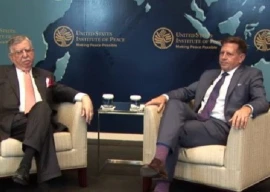
Adviser to Prime Minister on Finance Shaukat Tarin said on Monday a constitutional amendment would be required to pave the way for the approval of the of the State Bank of Pakistan (SBP) Amendment Bill, 2021 in its present form but the government lacked the two-thirds majority in parliament.
The approval of the amendment bill was the condition that was hampering a deal between Pakistan and the International Monetary Fund (IMF) for $1 billion loan tranche, Tarin revealed here.
The comments, at his media talks after the launching of the Pakistan Single Window initiative, suggested that the federal cabinet had in fact approved the draft of the bill in March 2021 in violation of the Constitution and in haste for securing a $500 million last loan tranche.
“The agreement with the IMF can be reached within two days. The matters with the IMF have been resolved except one issue for which we have sought legal opinion”, Tarin told reporters after the launch of the initiative – a digital platform to boost international trade.
In March, The Express Tribune had raised the issue of giving absolute autonomy to the central bank and approval of the bill by the federal cabinet without even reading it.
On a question, Tarin revealed that the pending condition was related to the SBP Amendment Bill 2021. “The agreement that had been reached last time with the IMF required some constitutional amendment, which cannot be done as we do not have two-thirds majority,” he said.
The legal experts from Pakistan and the IMF were also scheduled to meet on Monday to review whether the position taken by Pakistan about the constitutional amendment was correct. In case, both the sides converge their positions, the staff level agreement can be reached subject to fulfilment of few other prior actions, sources said.
During a meeting, Prime Minister Imran Khan on Monday also enquired from Tarin about the timing of the IMF agreement, the sources told The Express Tribune. They added that one possibility was that the bill, approved by the cabinet, should be amended again and the cabinet’s fresh approval should be secured to address the constitutional issues.
The sources said that at least three clauses that the federal cabinet had approved as part of attempts to give absolute autonomy without accountability were against a few constitutional provisions. In addition there were nearly a dozen other clauses that the federal government now wanted to withdraw to retain some kind of authority over the central bank, they added.
The ‘unconstitutional clauses’
Three clauses are now described as against the spirit of the Constitutional, which are related to a mechanism for removal of the SBP governor, giving absolute immunity to the governor and others from any kind of investigation and limiting parliament’s powers to amend the SBP law in the future.
The sources said that proposed sections 15, 46B and 52A of the SBP Amendment Bill 2021 were against the spirit of the Constitution. But the IMF was insisting that the bill should be passed without any amendment by parliament, they added.
The sources insisted that the kind of protection that the IMF was looking for the central bank governor was not even available to a judge of the Supreme Court of Pakistan. They added that the bone of contention was the removal mechanism for the governor.
Read More: Tarin hopes for success of IMF talks
The section 15 of the SBP Amendment Bill states: “The appointing authority shall remove the governor, the deputy governor and non-executive director or external member of the Monetary Policy Committee from the office in case of the occurrence of any of the incompatibilities or disqualifications specified in section 13 or if such person is found guilty of serious misconduct as determined by a court of law.”
The sources said that it was very difficult and time consuming that the charge of misconduct is proven in the court. Given the judicial process, by the time that the charge was proved, the governor or the deputy governor would have left the office after completing their terms in office, they added.
Under the existing law, a governor is appointed for three years but under the proposed law the limit is five year, to be extended by another five years. Incumbent Governor Dr Reza Baqir’s term will end in May next year.
The sources said that under the proposed law, the SBP Act in the future can only be amended with the prior consent of the central bank, which tantamount to limiting parliament’s powers.
The Subsection 8 of the section 46B that pertains to the functional and institutional autonomy, says, “The bank shall be consulted ex ante on any proposed legislative act related to the bank”.
The third main clause that is now seen as against the Constitution relates to the protection against the criminal investigations by anti-corruption agencies, said the sources.
The Subsection 3 of the Section 52A says: “Notwithstanding anything contained in any other law for the time being in force, including National Accountability Ordinance, the FIA Act, no action, inquiry, investigation or proceedings shall be taken against any official of the bank by the NAB or FIA or provincial investigation agency, bureau, authority or any institution by whatever name called without prior consent of the board of the directors.”
The Subsection 4 of 52A says: The protection and indemnification shall mutatis mutandis apply to former directors, governors, deputy governors, members of any board, committees, monetary policy committee, officers and employees of the bank for any act of commission and omission done during the service of the bank.”
COMMENTS (1)
Comments are moderated and generally will be posted if they are on-topic and not abusive.
For more information, please see our Comments FAQ





















After sbp autonomy .. what is next .. when they have to go to imf again.. what is left Feels like East India company all over again.